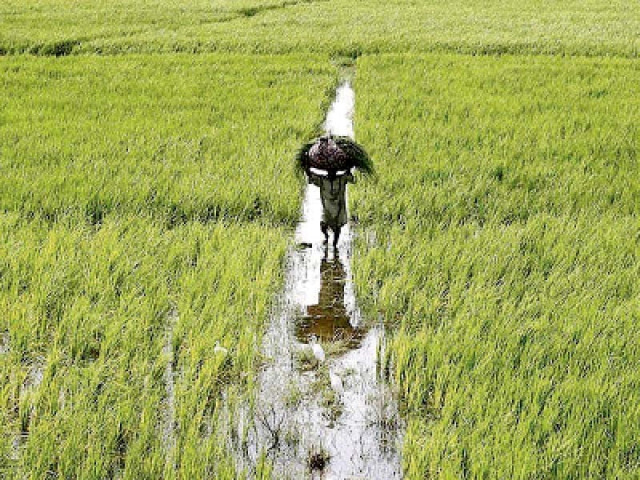With rains, crop outlook improves
Rainfall provides required water to kick-start sowing of major Kharif crops

The widespread monsoon rains have improved the outlook for major summer (Kharif) crops as water has become available
for plantations.
The recent rainfall has provided the required water to kick-start the sowing of major Kharif crops including cotton, paddy (raw rice), sugarcane and maize, which were delayed earlier by almost a month because of water scarcity.
“There was 40% less water available for the Kharif season (during May-June 2022),” an official of the Ministry of National Food Security and Research said while talking to The Express Tribune on Saturday.
The high-powered Federal Committee on Agriculture (FCA) said on March 31, 2022 “for the Kharif year 2022, the water availability in canals head will be 65.84 million acre feet (MAF) against last year’s 65.08 MAF”.
“Cotton production is expected to improve to 9.5-10 million bales (one bale weighs 170 kg) in the wake of ongoing rainfall in cotton belts in Punjab and Sindh,” said Pakistan Central Cotton Committee Vice President Dr Muhammad Ali Talpur.
“Cotton production will remain high, as farmers have improved crop management in the backdrop of higher prices in the domestic (and international) market.”
However, the output will remain lower by 5-10% compared to the initial production target of 10.5 million bales of cotton due to sowing over less-than-targeted area across the country.
Farmers have started the first round of picking seed cotton – raw cotton containing seed and lint – in southern Sindh. They are yet to harvest the crop in northern Sindh and Punjab.
“Low water availability, however, has delayed the second round of cotton production,” said Sindh Abadgar Board Vice President Syed Mahmood Nawaz Shah last week.
Cotton is a water-sensitive crop, which may be damaged in heavy showers. “The crop cannot survive if the rain water stands in the fields for over 24 to 48 hours,” Talpur said.
However, the paddy and sugarcane crops are water resilient. They have the ability to survive in slightly heavy rainfall. Besides, the paddy can be cultivated despite the recent delay, unlike cotton which could not be sown if it has not rained.
Pakistan produces rice and sugar in surplus quantity, which is more than the domestic requirement. “It produced 9.8 million tons of rice and 7.8 million tons of sugar against the domestic demand for 6.2 million tons for the sweetener last year,” Talpur said.
More rains cannot be ruled out in the middle of the monsoon season. “July (historically) remains a tough month for farmers from the raining point of view,” said Pakistan Metrological Department in its recent forecast.
“The area weighted normal rainfall in Pakistan during July-September is 140.8 mm,” it said on July 4.
In March, the FCA held detailed deliberations on the production targets for the essential Kharif crops of 2022-23 and decided to fix the cotton production target at 11 million bales from an area of 2.5
million hectares.
It fixed the rice production target at 8.6 million tons from plantatiosn over an area of 3.1 million hectares.
The committee fixed the sugarcane production target (2022-23) at 78.6 million tons over an area of 1.2 million hectares. Targets for other crops such as maize, moong, mash and chilli were also fixed.
The meteorological department said that overall normal rainfall was likely to occur all over the country, the FCA told the Ministry of National Food Security and Research.
“Sindh and Kashmir are likely to receive slightly above normal (+10%) rainfall during August and September. The area weighted normal rainfall in Pakistan during July-September is expected to be 140.8mm.”
Sindh Abadgar Board’s Shah said there was a notable delay in the sowing of major summer (Kharif) crops including paddy (rice) and cotton due to the unavailability of water
in June.
However, a large section of farmers prepared the land in June for sowing the crops on hopes of water supply soon.
“Paddy can be sown despite a notable delay, unlike cotton which cannot be planted if the sowing time has passed,” he said.
FCA was informed that rice and maize seeds would be available as per requirement.
A representative of the State Bank of Pakistan said the allocation of institutional credit for agriculture had substantially increased to Rs1,700 billion in 2021-22 and the disbursement up to January 2022 was Rs740.3 billion, which was 43.5% of the annual target of Rs1,700 billion and was 3.4% higher than the disbursement of Rs715.6 billion during
last year.
Published in The Express Tribune, July 10th, 2022.
Like Business on Facebook, follow @TribuneBiz on Twitter to stay informed and join in the conversation.



















COMMENTS
Comments are moderated and generally will be posted if they are on-topic and not abusive.
For more information, please see our Comments FAQ